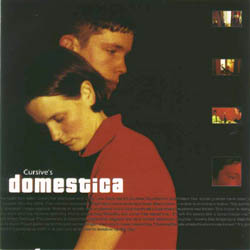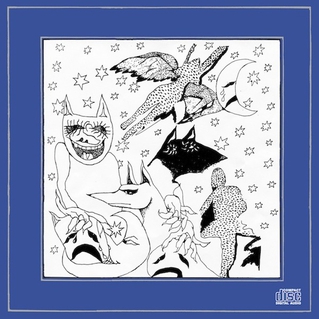Emo is a music genre characterized by emotional, often confessional lyrics. It emerged as a style of hardcore punk and post-hardcore from the mid-1980s Washington, D.C. hardcore scene, where it was known as emotional hardcore or emocore. The bands Rites of Spring and Embrace, among others, pioneered the genre. In the early-to-mid 1990s, emo was adopted and reinvented by alternative rock, indie rock, punk rock, and pop-punk bands, including Sunny Day Real Estate, Jawbreaker, Cap'n Jazz, and Jimmy Eat World. By the mid-1990s, Braid, the Promise Ring, and the Get Up Kids emerged from Midwest emo, and several independent record labels began to specialize in the genre. Meanwhile, screamo, a more aggressive style of emo using screamed vocals, also emerged, pioneered by the San Diego bands Heroin and Antioch Arrow. Screamo achieved mainstream success in the 2000s with bands like Hawthorne Heights, Silverstein, Story of the Year, Thursday, the Used, and Underoath.

Something to Write Home About is the second studio album by American rock band the Get Up Kids, released on September 28, 1999, through Vagrant Records and the band's own label Heroes & Villains Records. Following the promotional tours for their debut album Four Minute Mile (1997), the band were in discussion with Mojo Records. During this period, James Dewees joined as the band's keyboardist. As negotiations with the label eventually stalled, they eventually went with Vagrant Records. They recorded their next album at Mad Hatter Studios in Silver Lake, Los Angeles, California, co-producing it with Chad Blinman and Alex Brahl. Described as an emo and pop-punk album, Something to Write Home About expands on the harder edge of its predecessor, with frontman Matt Pryor citing the works of the Foo Fighters, Jimmy Eat World and Wilco as influences.
Pop-punk is a rock music fusion genre that combines elements of punk rock with power pop or pop. It is defined by its fast-paced, energetic tempos, and emphasis on classic pop songcraft, as well as adolescent and anti-suburbia themes. It is distinguished from other punk-variant genres by drawing more heavily from 1960s bands such as the Beatles, the Kinks, and the Beach Boys. The genre has evolved throughout its history, absorbing elements from new wave, college rock, ska, rap, emo, boy band pop and even hardcore punk. It is sometimes considered interchangeable with power pop and skate punk.

Relationship of Command is the third studio album by American post-hardcore band At the Drive-In, released on September 12, 2000. The album combines an aggressive edge with a melodic drive, harmonious, emotive vocals, and surreal lyrics. While it continues in the alternative style of At the Drive-In's previous albums, Relationship of Command is seen as a more well-rounded album than its predecessors. Initially received positively by critics, the album is now seen not only as one of the most influential post-hardcore albums of the 2000s, but also as one of the most accomplished recent works in the wider rock spectrum. Relationship of Command was voted twelfth out of 100 in the Albums of the Decade by NME, and the 37th most influential album of all time by Kerrang!. It was the band's final album to feature founding guitarist Jim Ward.

Everything You Ever Wanted to Know About Silence is the debut album of American rock band Glassjaw, released on May 9, 2000, by Roadrunner Records. It was produced by Ross Robinson. The album received positive reviews from critics, and has since been cited as an influential album in post-hardcore.

Deja Entendu is the second studio album by American rock band Brand New, released on June 17, 2003, by Triple Crown Records and Razor & Tie. It was widely praised for showing the band's maturation from their pop punk debut Your Favorite Weapon, and critics described the album as the moment when the band "started showing ambition to look beyond the emo/post-hardcore scene that birthed them."

Frame & Canvas is the third studio album by American rock band Braid. It was released on April 7, 1998, through Polyvinyl Record Co. After the release of the band's second studio album, The Age of Octeen (1996), drummer Damon Atkinson replaced Roy Ewing due to him being unable to commit to touring. Recording sessions took place at Inner Ear Studios in December 1997, with J. Robbins helping with production during the sessions. The album is an emo and post-hardcore release, for which the lyrics were co-written by vocalist/guitarists Chris Broach and Bob Nanna, or solely wrote by Nanna.

Diary is the debut studio album by American rock band Sunny Day Real Estate, released on May 10, 1994. The album is considered by many to be a defining emo album of the second wave, and key in the development of its subgenre, Midwest emo. It has also been called the missing link between post-hardcore and the nascent emo genre.

Domestica is the third studio album by the American indie rock band Cursive, released on June 20, 2000. This album was the 31st release by Saddle Creek Records, released on CD as well as both red and black vinyl.

"Ocean Avenue" is a song written and recorded by American rock band Yellowcard for their fourth studio album of the same name. It was released as the second single from Ocean Avenue on December 15, 2003, through Capitol Records. "Ocean Avenue" shares writing credits between the band's singer Ryan Key, guitarist Ben Harper, bassist Pete Mosely, drummer Longineu W. Parsons III, and violinist Sean Mackin. It was written about the band's teenage years along the Atlantic Coast. Neal Avron, a veteran punk rock producer, engineered and produced the tune.

The Power of Failing is the debut studio album from the Austin, Texas-based emo band Mineral. Released on January 28, 1997, The Power of Failing was made available on both LP and CD format and has since been acclaimed as an essential album from the 90s emo movement.

Rites of Spring is the only studio album by American post-hardcore band Rites of Spring. It was recorded at Inner Ear Studios in February 1985 and released on vinyl in June 1985 as Dischord Records #16. The album was produced by Ian MacKaye and contains twelve songs.

Do You Know Who You Are? is the first and only studio album by American rock band Texas Is the Reason. After finalizing their line-up, they wrote and released their self-titled debut EP in late 1995. Following that, they began recording their debut album at Oz Studios in Baltimore, Maryland, co-producing it with Jawbox member J. Robbins. Preceded by an east coast tour with labelmates Gameface, Do You Know Who You Are? was released on April 30, 1996 through Revelation Records. It was promoted with a European tour with Samiam, two US tours, and a tour of Germany with Queerfish and Starmarket. Shortly after the Germany stint, the group broke up.
"The Sea Is a Good Place to Think of the Future" is a song by Welsh indie pop band Los Campesinos!, released on 2 September 2009 as a promotional single for their third studio album, Romance is Boring.

Cerulean Salt is the second studio album by American indie musician Waxahatchee, released on March 5, 2013, on Don Giovanni Records. Co-produced by Swearin' members, Kyle Gilbride and Keith Spencer, the album was recorded in primary recording artist Katie Crutchfield's basement.

Cruise Your Illusion is the debut studio album by American punk rock group Milk Music. It was released on April 2, 2013, via Fat Possum Records on CD and digital formats. The vinyl version of the album was self-released by the band.
The emo revival, or fourth wave emo, was an underground emo movement which began in the late 2000s and flourished until the mid-to-late 2010s. The movement began towards the end of the 2000s third-wave emo, with Pennsylvania-based groups such as Tigers Jaw, Algernon Cadwallader and Snowing eschewing that era's mainstream sensibilities in favor of influence from 1990s Midwest emo. Acts like Touché Amoré, La Dispute and Defeater drew from 1990s emo and especially its heavier counterparts, such as screamo and post-hardcore.

Pinegrove is an American rock band formed in Montclair, New Jersey in 2010. The band's lineup is largely fluid and variable, with singer-songwriter Evan Stephens Hall and drummer Zach Levine representing its core members. The two met as children and played in various bands before founding Pinegrove. The band's musical style, which uses instruments such as the banjo and pedal steel guitar, is commonly described as a mix between alt-country and emo. Pinegrove's early years were spent self-releasing music – including their debut album, Meridian (2012) – and performing do-it-yourself (DIY) house shows.
Midwest emo refers to the emo scene and/or subgenre that developed in the 1990s Midwestern United States. Employing unconventional vocal stylings, distinct guitar riffs and arpeggiated melodies, Midwest emo bands shifted away from the genre's hardcore punk roots and drew on indie rock and math rock approaches. According to the author and critic Andy Greenwald, "this was the period when emo earned many, if not all, of the stereotypes that have lasted to this day: boy-driven, glasses-wearing, overly sensitive, overly brainy, chiming-guitar-driven college music." Midwest emo is sometimes used interchangeably with second-wave emo. Although implied by the name, Midwest emo does not solely refer to bands and artists from the Midwestern United States, and the style is played by outfits across the United States and internationally.
Emo rap is a fusion genre of hip hop and emo music. Originating in the SoundCloud rap scene in the mid-2010s, the genre fuses characteristics of hip hop music, such as beats and rapping, with the lyrical themes, instrumentals, and vocals commonly found in emo music. Lil Peep, XXXTentacion, and Juice Wrld are some of the most notable musicians in the genre.














